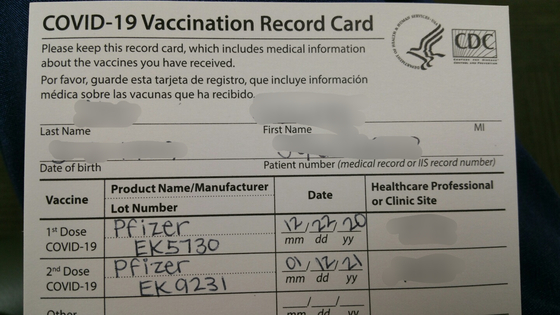“At least now I am free from the fear and fear of passing (the virus) to my family or dealing with COVID-19 patients.”

Mr. B’s Pfizer Bioentech vaccine certificate. Provided by Mr. B
This is the story of a Korean American, 62, who works in the diagnostic radiology department of a hospital in Michigan, USA. He is one of the medical staff fighting at the forefront against the spread of the novel coronavirus infection (Corona 19). The U.S. has the largest number of corona19 confirmed and dead in the world. On the 16th (local time), Johns Hopkins University in the U.S. announced that there were 23545,000 cumulative corona19 confirmed cases in the U.S. and 392,000 cumulative deaths. 25% of confirmed cases worldwide and 19.5% of deaths came from the United States.
Mr. B is also exposed to the risk of corona 19 infection every day. This is because it is in charge of taking radiographs of 3 to 4 corona19 patients a day. Mr. B did not hesitate to get the vaccine. He finished the first vaccination of the Pfizer vaccine on December 22 last year (local time) and the second vaccination on the 12th.
After the first vaccination, Mr. B immediately entered normal work. He said, “I got the vaccine on my left arm at 5:30 am, and there was a little pain at the injection site,” he said. “When I was still there was no feeling, but when I raised my left arm, I felt pain.”
However, after the second vaccination, the reaction was a little different. Mr. B said, “I was hit at 6:30 am, and from that evening there was pain, nausea, and fatigue at the injection site.” When asked about the choice of vaccination, he said, “I can’t choose because it’s right as it was supplied by the hospital.”
“I’m not as distrustful of vaccines as in Korea”

He is getting the Pfizer vaccine. Reuters = Yonhap News
Regarding reports of deaths following the Pfizer-Bioentech vaccination, he said, “I have no worries about side effects.” Mr. B said, “I’ve been given the flu vaccine for 20 years, and there was nothing wrong with it,” he said. “There is no fear of vaccination because of this.” He added, “Because the exact cause of the vaccine death has not yet been identified, I think it is too hasty (reported),” he added. “There are not many people here who distrust vaccines like Korea.”
Mr. B said that most of the occupations (doctors, nurses, medical technicians, cleaners, cooks, medical equipment and drug delivery personnel, etc.) working at the forefront of Corona 19 in the United States have completed the first dose of the Corona 19 vaccine. Regarding the concerns of Koreans in the United States about the side effects of vaccines, he replied, “Because it may be right, it is too early to worry.”
According to the hospital newsletter posted on the homepage of the hospital where Mr. B works on the 7th (local time), about 18,000 employees at the hospital were or are expected to get the vaccine. 7100 people, or 21% of the total number of employees, refused the vaccination. Hospital A explained, “There is no obligation to disclose the reason for refusing vaccination. If you change your mind later and want to be correct, you can apply.” Mr. B said, “Because vaccination is not compulsory, the injection is known, but he has the right to refuse (inoculation) because of mental and physical weakness or chronic disease.”
“Immune response is stronger at the second dose”

Pfizer Bioentech Fact sheet for recipients and caregivers. Provided by Mr. B
According to the guide Pfizer-Bioentech gave to vaccination subjects, pain, congestion, swelling, fatigue, headache, muscle pain, chills, joint pain, fever, nausea, discomfort, and lymph gland swelling were reported at the vaccination site. Severe allergic reactions include shortness of breath, swelling of the face and neck, rapid heartbeat, red rash on the body, dizziness and weakness. If you have a serious allergic reaction such as the above, call 911 or ask to go to the nearest hospital.
Kim Woo-joo, a professor of infectious medicine at Korea University, said about the reaction after vaccination of Mr. B, “more than 80% of them have a stronger immune response in the second time.” He added, “Generally, the reaction and antibody production are proportional to each other.”
Experts suggest that close observation and accurate information, such as grasping the causal relationship between the patient’s condition and the vaccine, are needed while being wary of growing distrust of the vaccine due to excessive fear.
Prof. Kim said about the news that a patient died after vaccinating Pfizer in Norway, etc. “In the case of debilitating or elderly patients, even minor adverse reactions after vaccination can lead to death.” You have to be more careful,” he said. “There is no vaccine without side effects,” he added. “Vaccines are supposed to be vaccinated when the benefits outweigh the risks.”
Jeong Ki-seok, a professor of respiratory medicine at Hallym University, said, “The government should take the center and obtain the maximum information in real time, make accurate judgments, and inform the public immediately. If the people are afraid of vaccines and are constantly exposed to incorrect vaccine-related information, the inoculation rate I can’t increase it,” he said.
Reporter Jeong Hee-yoon [email protected]
